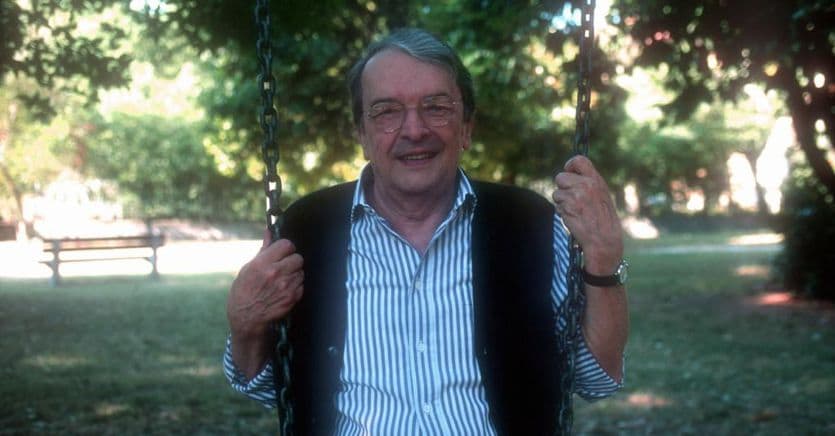There is no better location than the “Sole 24ore” to commemorate the centenary of the birth of Luigi Meneghello (1922-2007) who – from the day after his return to Italy after the long English expatriation (1947-2004) – contributed to it in the final three years of his life for a total of twenty-eight articles published monthly in the newspaper’s cultural supplement under the title of Nuove carte (today in the volume The apprenticeship. Nuove carte 2004-2007, ed. by C. De Muru and A, Gallia, Rizzoli 2012).
Here we are, then, to remember him – after his last article, which appeared posthumously on 7 July 2007, entitled “I, apprentice of the pen”, in which he focused on some parts of his lectio magistralis delivered in Palermo on 20 June 2007 on the occasion of the honorary degree in Modern Philology conferred on him together with Vincenzo Consolo (1937-2012), whose 10th anniversary of his death is this year.
The occasion to remember one of the most extraordinary writer-translators of our 20th century, one of the most European and international, is offered by the series of events put in place by the newly established National Committee for the celebrations of the birth of Luigi Meneghello who, with few means and a lot of passion and competence, he has already promoted some memorable days in Malo, Padua, Florence. In particular in the city of the lily, with the collaboration between the Accademia della Crusca and the University of Florence, a meeting was held, entitled “Florence for Luigi Meneghello”, divided between the two prestigious locations, which allowed the public to hear the words profound moves from the work and ethics of Meneghello thanks to scholars and scholars of a life of the Maladense writer, including John Scott, Franco Marenco, Ernestina Pellegrini, Francesca Caputo, Pietro De Marchi, Luciano Zampese. And, among the youngest, Diego Salvadori and Francesca Cheli, meaning that Meneghello is still vital and ‘alive’, like the unforgettable ‘oseleto’ of his first language vs the stuffed ‘little bird’ of the high-literary tradition, even among the less aged.
Bran
The day, opened at the Crusca by President Claudio Marazzini, began with the refined intervention of Gianluigi Beccaria who, with attention to the relationship between language of expression and mother dialect, insisted that “writing is research”, a trait that unites the exponents of the magnificent Venetian triad Bandini-Meneghello-Zanzotto. Mario Barenghi therefore historically placed Meneghello in the generation of writers who encountered World War II at the age of twenty. Scott – who shares with Marenco the experience of having been young assistants at Reading University in the legendary department of Italian studies founded by Meneghello – focused on the second intellectual pole constituting the DNA of the writer from Malo: the English one. The afternoon session, in Piazza San Marco, was opened by an intervention by the pedagogist Vanna Boffo who finds in Meneghello’s texts a valid material for the teaching and training of future teachers.
The readings of Meneghello’s masterpieces
Also beautiful are the readings of Meneghello’s masterpieces made by Marenco who defines him as an “international-popular writer” and shows his “three-pointed comparatism” (English, Italian, Upper Vicenza); Massimo Fanfani, on language and style in the Little Masters; and by Ernestina Pellegrini on the “phonic body” of Libera nos in Malo. Salvadori on the relationship between Meneghello and Nature and the very young Cheli, freshly graduated from the papers, raised other critical points. Arianna Antonielli focused on the relationship between Meneghello and Yeats. The intense day ended with the trio De Marchi, Zampese and Karen F. Mclachlan who read, commented on and made Meneghello’s poetry acoustic in translation or almost. Verses by Yeats and Shakespeare, among others, read first in the original English, then in the quasi-translation-recreation of Meneghello in Alto-Vicentino, then in the Italian “service” translation (made by De Marchi and Zampese). In the midst of so many quotes, references, sound inlays and phonic games always on the line between irony and seriousness, Meneghello would have smiled and applauded to others and … to himself.
